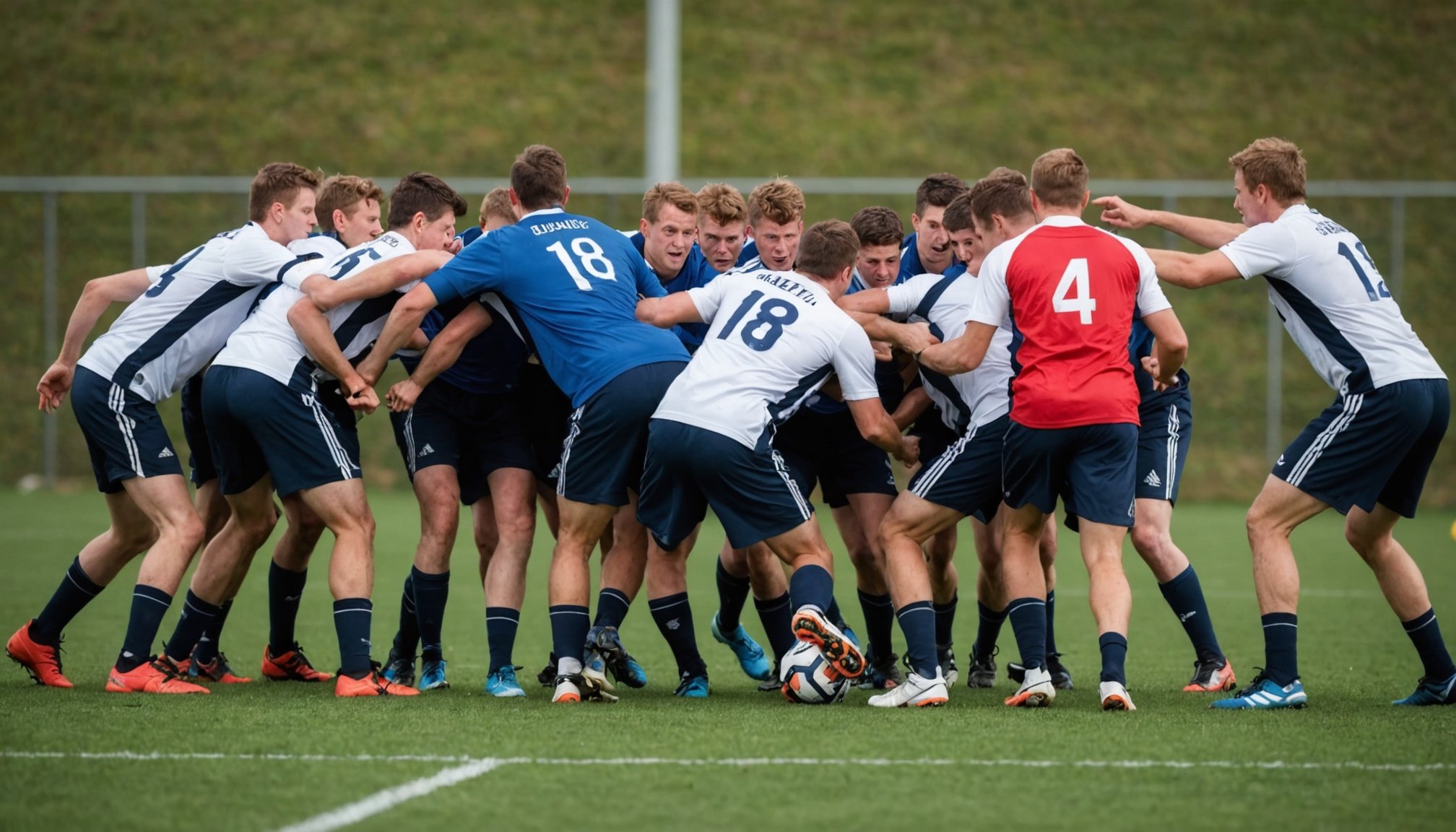Unlocking Athletic Resilience: Proven Tactics to Triumph Over Major Sports Setbacks
Understanding Mental Toughness in Sports
When it comes to achieving success in sports, the physical aspect is often the first thing that comes to mind. However, the mental side of the game is just as crucial, if not more so. Mental toughness is the backbone of an athlete’s ability to perform at their best, even in the face of adversity.
“Mental toughness is the ability of an athlete to do the job they’ve been trained to do regardless of what’s happening to them,” explains a coach from WG Coaching[4]. This definition underscores the importance of mental resilience in sports, where athletes must navigate through various challenges, from physical injuries to emotional setbacks.
Additional reading : Discovering excellence: top cross-training techniques to elevate competitive figure skaters
Building Resilience in Young Athletes
For young athletes, developing mental toughness is a critical component of their training. At Hoops Academy, coaches emphasize the importance of resilience and focus to enhance performance both on and off the field.
“We teach our young athletes to see challenges as strength builders, meaning that after a loss they are even stronger to push forward,” notes a coach from Hoops Academy. This approach involves fostering a growth mindset where athletes view challenges as opportunities for growth rather than obstacles to success[1].
Have you seen this : Top nutritional boosts every swimmer should focus on during heavy training sessions
Here are some key strategies used to build resilience in young athletes:
- Visualization: This technique involves imagining successful outcomes and overcoming challenges. It helps athletes prepare mentally for different scenarios and build confidence.
- Positive Self-Talk: Encouraging positive self-talk can significantly boost an athlete’s confidence and ability to withstand stress and discomfort. For example, instead of saying “I’m so weak,” an athlete could say “I’ve got this!”[3].
- Self-Reflection: Regular self-reflection helps athletes understand their strengths and weaknesses, allowing them to make necessary adjustments and improve their mental game.
- Creating a Supportive Environment: Coaches at Hoops Academy ensure that the training environment is encouraging and supportive, which is essential for cultivating a positive mindset and increasing mental resilience[1].
Strategies for Improving Mental Toughness
Improving mental toughness is not a one-size-fits-all approach; it requires a combination of various strategies tailored to the individual athlete’s needs.
Reflecting on Your Narrative
One of the key strategies suggested by David Charlton, a Mental Toughness Practitioner, is to reflect on your own narrative and find ways to make it more empowering. This involves understanding the stories you tell yourself about certain situations and events and adjusting them to be more positive and motivating[2].
Creating a “Board of Directors”
Another strategy is to create a real and imaginary “board of directors” of mentors and inspirational figures to provide guidance. This can include coaches, family members, or even historical figures who embody the qualities you aspire to[2].
Embracing Fear and Staying Present
Embracing fear as a tool for growth and staying present in the moment are also crucial. In CrossFit, for example, athletes are encouraged to focus on the current movement and technique rather than worrying about the entire workout. This helps in reducing stress and improving performance[3].
Techniques for Mental Focus and Resilience
Several techniques can be employed to enhance mental focus and resilience, particularly in high-pressure sports environments.
Positive Self-Talk and Visualization
Positive self-talk and visualization are powerful tools. By using positive affirmations, athletes can improve their confidence and ability to handle stress. Visualization helps in preparing mentally for different scenarios, which can enhance performance under pressure[3].
Maintaining Technique Under Stress
In CrossFit, maintaining proper technique even when fatigued is a sign of mental toughness. This involves committing to preserving great technique even when the body is screaming to stop or take shortcuts[3].
Valuing Your Workout
Understanding the value of your workout can also boost mental toughness. When athletes perceive their workouts as valuable and aligned with their goals, they are more willing to push through challenges and discomfort[3].
Measuring and Coaching Mental Toughness
Coaching mental toughness requires a clear understanding of what it entails and how to measure it. Here’s an example from a professional football team:
- Identifying Key Situations: Coaches identified specific situations where mental toughness was crucial, such as after a collision, missing an opportunity, receiving a poor decision from an umpire, making a mistake, or being fatigued.
- Measuring Performance: By flagging these incidents during games and analyzing the athletes’ performance before and after, coaches could measure and improve mental toughness[4].
Practical Insights and Actionable Advice
Here are some practical insights and actionable advice for athletes and coaches looking to enhance mental toughness:
Prioritize Personal Development
Spending time working on personal development is essential. This includes identifying and managing character traits that can hold you back and creating better routines and habits[2].
Manage Emotions Better
Learning to manage emotions better is critical. This involves understanding how to cope with pressure and challenges more effectively and maintaining positive mental health[2].
Focus on Goal Setting
Goal setting is a powerful tool for enhancing mental toughness. By setting clear, achievable goals, athletes can stay focused and motivated even in the face of adversity.
| Strategy | Description | Benefits |
|---|---|---|
| Visualization | Imagining successful outcomes | Boosts confidence, prepares mentally for challenges |
| Positive Self-Talk | Using positive affirmations | Improves confidence, reduces stress and discomfort |
| Self-Reflection | Regularly analyzing strengths and weaknesses | Helps in making necessary adjustments, improves mental game |
| Creating a Supportive Environment | Ensuring an encouraging and supportive training environment | Cultivates a positive mindset, increases mental resilience |
| Reflecting on Your Narrative | Adjusting personal narratives to be more empowering | Enhances motivation, improves mental toughness |
| Embracing Fear | Using fear as a tool for growth | Increases resilience, improves performance under pressure |
| Maintaining Technique Under Stress | Preserving great technique even when fatigued | Sign of mental toughness, improves performance in high-pressure situations |
| Valuing Your Workout | Perceiving workouts as valuable and aligned with goals | Increases willingness to push through challenges and discomfort |
Overcoming Performance Anxiety and High Pressure
Performance anxiety and high-pressure situations are common challenges athletes face. Here are some strategies to overcome them:
Staying in the Moment
Focusing on the present moment rather than worrying about the future or past can significantly reduce performance anxiety. In CrossFit, athletes are advised to concentrate on the current movement and technique rather than the entire workout[3].
Positive Self-Talk
Using positive self-talk can help manage performance anxiety. By treating themselves compassionately and using affirmations like “I got this!” or “I’m moving so well!”, athletes can improve their confidence and performance[3].
Understanding the Value of Your Workout
Believing in the value of your workout can also help in managing high-pressure situations. When athletes see their workouts as valuable and aligned with their goals, they are more motivated to perform at their best[3].
Mental Health and Well-being
Mental health and well-being are integral to an athlete’s overall performance. Here are some key points to consider:
Maintaining Positive Mental Health
Coaches and athletes must prioritize maintaining positive mental health. This involves managing emotions better, coping with pressure and challenges more effectively, and ensuring a healthy work-life balance[2].
Emotional Well-being
Emotional well-being is crucial for athletes. Coaches at Hoops Academy emphasize the importance of emotional well-being, teaching young athletes to build their emotional muscle alongside their physical strength[1].
Unlocking athletic resilience is a multifaceted process that involves a combination of mental, emotional, and physical strategies. By understanding the importance of mental toughness, employing proven tactics, and prioritizing mental health and well-being, athletes can overcome major sports setbacks and achieve peak performance.
As David Charlton notes, “By focusing some attention on improving your mental toughness by creating better routines and habits, you can give yourself a great chance to make 2025 one of your best years to date”[2].
In the words of a CrossFit coach, “The most essential adaptation that occurs with CrossFit is between the ears. Those who have been doing CrossFit for some time know this to be true. A great example of this is the improved mental toughness CrossFit athletes gain”[3].
By adopting these strategies and maintaining a growth mindset, athletes can not only excel in their sport but also develop the mental resilience needed to succeed in all areas of life.











